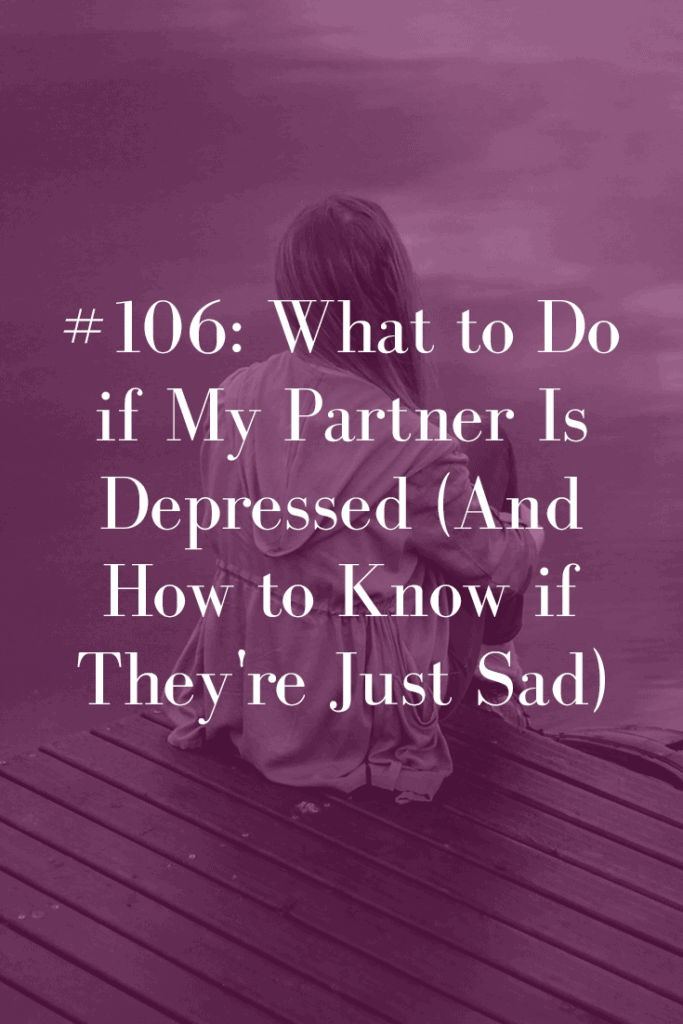
Depression is more common than you may think! According to the World Health Organization, more than 264 million people worldwide experience depression. There are many different types of depression and the symptoms can vary among people. But the big question is, how do you know if someone is depressed or just having a hard time? And once you know, what should you do?
Today I’m answering all your questions and, as always, giving my top 5 tips, and an amazing tool you can use right away to start some change. So, let’s jump in!
If you believe someone might be considering suicide, talk to them about it now. You can help them find support and do your best to keep them safe. Contact the National Suicide Prevention Lifeline or dial 911 in the United States.
Sadness and Depression Are Different
When dealing with your partner (or anyone for that matter) who seems depressed, the first thing you need to do is think through whether they’re depressed or sad. I’m not saying you need to become a psychologist (and recommend that you don’t get too into diagnosing), but I do want you to feel equipped to handle either situation. As you might imagine, what I suggest you do if someone you love is sad is different than what I suggest you do if that person is clinically depressed.
What Depression Really Is
Clinical depression is actually a very serious and common mood disorder. The biggies are that depressed folks have persistent feelings of sadness and hopelessness and tend to lose interest in things they used to enjoy.
We therapy people use a booked called the Diagnostic and Statistical Manual of Mental Disorders (the DSM, which is now in its fifth revision) to diagnose all mental disorders from autism to depression to narcissism.
The symptoms outlined in the DSM for depressive disorder are as follows:
- Depressed mood most of the day, nearly every day.
- Markedly diminished interest or pleasure in all, or almost all, activities most of the day, nearly every day.
- Significant weight loss when not dieting or weight gain, or decrease or increase in appetite nearly every day.
- A slowing down of thought and a reduction of physical movement (observable by others, not merely subjective feelings of restlessness or being slowed down).
- Fatigue or loss of energy nearly every day.
- Feelings of worthlessness or excessive or inappropriate guilt nearly every day.
- Diminished ability to think or concentrate, or indecisiveness, nearly every day.
- Recurrent thoughts of death, recurrent suicidal ideation without a specific plan, or a suicide attempt or a specific plan for committing suicide.
So, What Can You Do? My Top 5 Tips for Dealing with a Depressed or Sad Partner
1. Get Thee to a Doctor. A doctor visit is first and foremost. Making an appointment with a trained mental health professional would be best. But, if your partner balks at this, start with a physical to rule out any other issue that could be missed (like substance abuse or another medical condition).
2. Make Home as Healthy as Possible. Whether your partner is depressed or sad, creating a healthy home environment will be beneficial to everyone.
3. Help with Disputing Negative Thoughts. Remember that your partner’s brain has been hijacked and they’re having a hard time thinking clearly. Help them to critically think. This means disputing negative thoughts. I’ve got a great tool to help change feelings and dispute negative thoughts that you can download for free!
4. Ask Collaborative Questions Instead of Doing for Them. If your partner is depressed, you’re walking a tightrope between helping too much and not enough. I highly suggest asking collaborative questions first before doing anything “for” them. When depressed people start doing things for themselves, it actually helps them out of the depression, so you don’t want to take this away. Having said that, sometimes depressed people can’t quite get going or do much for themselves and need your assistance getting help and getting stronger. Sigh…
5. Don’t Take it Personally. If you’re living with someone who’s depressed it can be very difficult not to take it personally, especially if they’re blaming you!
Resources and Links:
Change How You Feel with This Easy Tool
How to Get Out of Negative Thinking












